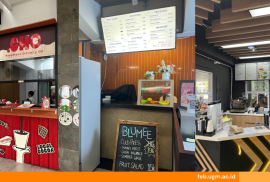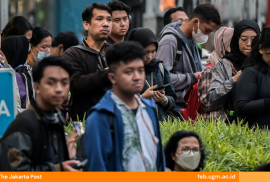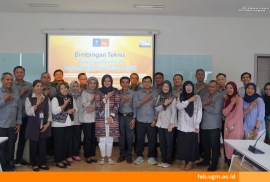Philosophy understanding in the research approach is very important for researchers in conducting accounting and business research. On Friday (23/4), the Master of Science and Doctoral Program of the Faculty of Economics and Business Universitas Gadjah Mada (FEB UGM) in collaboration with the Laboratory of the Department of Accounting, FEB UGM held the third webinar in the seventh series of webinars with the theme “Philosophy and Approaches to Accounting and Business Research” which discusses various different paradigms in each session. The 3rd series of this webinar brings up the topic of “Interpretivisma Paradigm” in Accounting and Business Research. This webinar is held online through the Zoom Meetings platform and can also be watched on the Youtube Channel of the Faculty of Economics and Business UGM. The moderator who sparked the discussion at this webinar was Achmad Faizal Azmi S.E., B.Sc., M.Sc, Lecturer at FEB UGM. The resource person who will discuss the topic of Interpretivisma Paradigm is Dian Kartika Rahajeng, S.E., M.Sc., Ph.D, a lecturer at FEB UGM as well as the Head of the University of Gadjah Mada’s Accounting Department Laboratory.
Ajeng started the discussion by explaining the basic concepts of philosophy and research. She said that understanding philosophy and paradigm is a way of looking at interpreting a phenomenon or a reality. “The phenomenon is in front of us, but how we see it, will bring the definition of truth in a certain point of view. This is a debate, ” she explained.
Ajeng said that differences in perspective are not wrong, because philosophy is about how a person sees things and how humans react to phenomena and interpret a situation. Regarding what phenomena we want to study, when humans see many specific phenomena, according to her, humans will focus on a phenomenon, and choose a reality to be reviewed.
“After understanding and seeing something, for example, there is a phenomenon of startup, fintech, fraud. We don’t limit ourselves to basic concepts. What we explain is more than that, for example more about life, how we see and understand things, how and what to learn, from there we will know how a data reality is understood, developed, and implemented, “said Ajeng.
After understanding and seeing phenomena, it is necessary to compile epiostemology, namely what our goals and benefits are in the phenomenon to be studied so that then choosing a research methodology and approach, establishing paradigms, and establishing the right instruments for research.
Regarding the definition, according to Ajeng, the Interpretivisma Paradigm contains the science of human interaction which will contain sociology. This is because the Interpretivisma view is obtained from the reality of deconstruction by the actors in it, namely the social construct in which there are many individuals. The Interpretivism approach argues that knowledge is mediated by the interpretation process by social actors as measured by logical processes and subjective interpretations, aimed at individuals or social constructs.
“For example, looking at the phenomenon of fraud cases, we know the reality of fraud, how the people or individuals in it react in this phenomenon or case. It is very logical to define fraud cases from the perspective of the impacted, to find out what they really feel, “said Ajeng.
Therefore, the research method in the Interpretivism Paradigm that can be used is one of them using interviews and subjective interpretation observations that are aligned with the interpretations of the actors. Not limited to those two things, the methodologies used in the Interpretivisma approach are very diverse, for example using the Ethnographic method, where humans place themselves in the environment and ecosystem for a long duration to understand the existing social constructs.
Ajeng said that Interpretivism becomes the “umbrella” for several different thoughts such as phenomenology, hermeneutics, symbolic interactions, and so on. Interpretivism is a very broad umbrella that can then explain and view phenomena in social constructs in reality. However, sometimes interpretivism is often placed in a dichotomy with a positivism approach and is associated with terms such as post-positivism, so that the boundary with the Positivism Paradigm becomes unclear. It is because Positivism also says that humans are central actors in the development of Science and Technology (IPTEK), they need to consider their perceptions, their opinions, and their perspectives. She cite the opinion of Lincoln (2011) which states that at a philosophical level, interpretivism holds a contrasting view but there is an overlap in methodology, so that the paradigm boundaries are blurred.
Finally, Ajeng conveyed the challenges of conducting research with the Interpretivism approach.
“As a researcher, we must capture all phenomena and perceptions in these phenomena. For example, actors A, B, and C have different perspectives. The challenge in Interpretivisma is that if there is a miss, for example, it will be close to A and B without C, and D, will not be complete. During the interview, we have to get a broad perspective that can explain the phenomenon from various sides, ”she explained.
Regarding advantages, according to Ajeng, the Interpretivism Paradigm has higher internal validity, rich and exploratory qualitative data, and being able to listen to individual voices and insights from difficult or untouched communities. While the limitations are less objectivity, limited population, and prone to the possibility of losing reliability from previous studies.
“Glasses can not be compared to how we see things, it depends on the phenomena to be studied, nothing is true, nothing is wrong, but what we have to make sure is that we wear the right glasses, that’s the point”, concluded Ajeng.
Reportage: Sony Budiarso / Kirana Lalita Pristy




